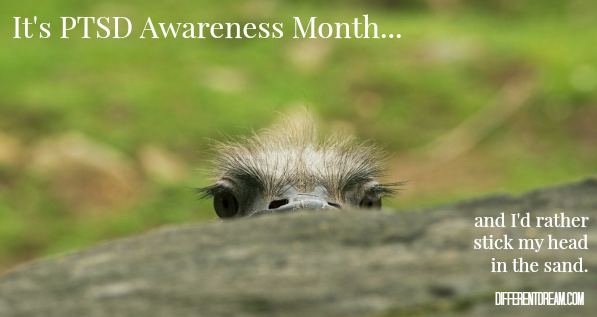June is PTSD Awareness Month–Again

June is PTSD Awareness Month–again. If I had my druthers, I’d do the ostrich thing and bury my head in the sand. Because PTSD Awareness Month is hard for me.
It brings back memories of the early days of my baby’s life and the medical treatment he endured as doctors and nurses labored to save him in 1982. It stirs up regret at not recognizing his mental anguish or finding the treatment he needed until 26 years later. It pains me to tell our family’s story to parents of children who are struggling with trauma and watch them turn away from a reality they aren’t yet ready to acknowledge.
But PTSD Awareness Month is not about my druthers. It is about sharing what’s known about PTSD, and in my case about PTSD in children, so information is accessible to parents when they are ready.
So this month, instead of sticking my head in the sand, I’m writing another post about PTSD in children. I’m sharing truths about a preventable mental illness that affects far too many children around the world:
- Newborns do feel pain.
- Infants can remember trauma.
- Childhood trauma can develop into PTSD.
- PTSD in children who have suffered trauma can be prevented.
- Effective treatments for PTSD do exist.
- Children as young as 3 can be treated.
- If you think your child may have PTSD, seek treatment now.
- Adults with untreated childhood PTSD can be treated, too.
To read the rest of this post visit the special needs parenting blog at the Key Ministry website.
Do you like what you see at DifferentDream.com? You can receive more great content by subscribing to the quarterly Different Dream newsletter and signing up for the daily RSS feed delivered to your email inbox. You can sign up for the first in the pop up box and the second at the bottom of this page.
By Jolene
Jolene Philo is a published author, speaker, wife, and mother of a son with special needs.
Subscribe for Updates from Jolene
Related Posts
How Do I Let Go of My Adult EA/TEF Child?
Valeria Conshafter explores the question “How do I let go of my adult EA/TEF child?” for EA/TEF Awareness Month.
The Physical Manifestations of Grief in Caregivers
Jolene explains how the heaviness of loss and sorrow can contribute to the physical manifestations of grief in caregivers.
Experiencing Post-Traumatic Growth while Raising a Child with Disabilities
Jolene explains the benefits of experiencing post-traumatic growth while raising a child with disabilities.






0 Comments